Mitali Perkins's Blog, page 17
January 22, 2014
Questions for Gene Luen Yang, Author of BOXERS AND SAINTS
 Today I'm thrilled to host Gene Yang, one of the contributors to Open Mic Anthology (Candlewick), via skype in my Jan Term class at Saint Mary's College of California. My students have prepared questions to ask him, and here are a few:
Today I'm thrilled to host Gene Yang, one of the contributors to Open Mic Anthology (Candlewick), via skype in my Jan Term class at Saint Mary's College of California. My students have prepared questions to ask him, and here are a few: Do you find that because of your background as a Chinese-American, you have integrated your own characteristics into some of the characters? Especially because of your ancestry, do you feel a connection with the characters you have created?
Have you ever been criticized for not having an authentic-enough experience to write your stories, considering you are Chinese-American? If yes, what is your response to critics?
What made you write about the Boxer Rebellion? What is more special about this event than others in Chinese history that made you spend precious time on this subject?
What kind of research did you have to do to make the story more authentic since you were originally born in California? Was your upbringing more American or Chinese and how did this contribute?
How does your faith play a role when writing your stories?
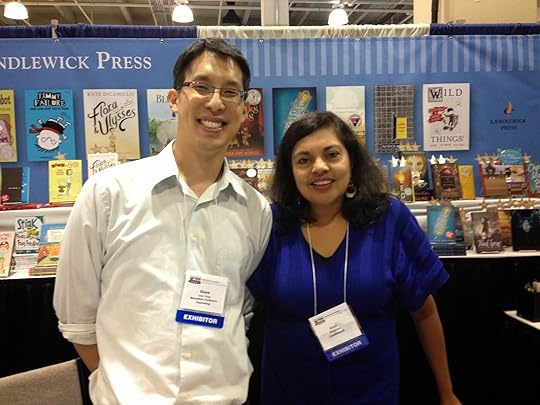 Can't wait to hear Gene's answers. If you haven't read BOXERS AND SAINTS, I couldn't put it down. Historical fiction in graphic novel format is going to be my preference from this day forward. Here's some of what I wrote Gene after I finished it: "I love how Vidiana was able to protect her enemy with the Lord’s prayer. In the middle of such chaos and despair, you showed—with finesse and restraint—how one girl’s faith can make a difference. Thank you."Come visit me on the Fire Escape!
Can't wait to hear Gene's answers. If you haven't read BOXERS AND SAINTS, I couldn't put it down. Historical fiction in graphic novel format is going to be my preference from this day forward. Here's some of what I wrote Gene after I finished it: "I love how Vidiana was able to protect her enemy with the Lord’s prayer. In the middle of such chaos and despair, you showed—with finesse and restraint—how one girl’s faith can make a difference. Thank you."Come visit me on the Fire Escape!



Published on January 22, 2014 08:59
January 11, 2014
Race, Culture, and Power in Children's Stories
Once again, my Jan Term course at
Saint Mary's College of California
called "Race, Culture, and Power in Children's Stories" is underway. Here's the first part of my syllabus:
Why are children’s stories so powerful? Who has the right to tell stories about marginalized communities? This course will explore the question of authenticity in storytelling and unmask explicit and implicit messages about race, power, and culture communicated through books for young readers. A secondary course goal is to help students improve their analytical writing.
Part One: The Subversive Power of Children’s StoriesPart Two: Race in Children’s StoriesPart Three: Culture in Children’s StoriesPart Four: Power in Children’s BooksAlison Lurie, author of Don’t Tell The Grown-ups: The Subversive Power of Children’s Literature makes this argument about how children’s books can affect the common good:
Students will explore and debate five questions:
(1) BOOK COVERS: Should young adult and middle grade novels depict faces on covers?
(2) BOOK AWARDS: Should ethnic book awards be based on the race/ethnicity of the author/illustrator?
(3) BANNING: Should certain children’s books be banned in homes and classrooms because of racism or cultural stereotyping?
(4) BOWDLERIZATION: Should we “bowdlerize” children’s classics that—seen with today’s eyes—are racist, or let them stand and be read as is?
(5) AUTHENTICITY: Should a story be told only by a cultural “insider” to guarantee authenticity?
This year I'm privileged to introduce my 23 students via Skype to Gene Yuen Yang, award-winning author of BOXERS AND SAINTS, Stacy L. Whitman, editor at TU Books , and Yolanda Leroy, editorial director of Charlesbridge . Since the theme of Jan Term 2014 is " metamorphoses ," students will be comparing the "hero's journeys" in two novels for middle grade or young adult readers, and analyze themes of race, culture, and power in each story.
Students debated the question of book covers yesterday, and here are the presentations for your consideration.
THE CASE FOR NO FACES ON COVERS:
THE CASE FOR FACES ON COVERS: Come visit me on the Fire Escape!




Why are children’s stories so powerful? Who has the right to tell stories about marginalized communities? This course will explore the question of authenticity in storytelling and unmask explicit and implicit messages about race, power, and culture communicated through books for young readers. A secondary course goal is to help students improve their analytical writing.
Part One: The Subversive Power of Children’s StoriesPart Two: Race in Children’s StoriesPart Three: Culture in Children’s StoriesPart Four: Power in Children’s BooksAlison Lurie, author of Don’t Tell The Grown-ups: The Subversive Power of Children’s Literature makes this argument about how children’s books can affect the common good:
The great subversive works of children's literature suggest that there are other views of human life besides those of the shopping mall and the corporation. They mock current assumptions and express the imaginative, unconventional, noncommercial view of the world in its simplest and purest form. They appeal to the imaginative, questioning, rebellious child within all of us, renew our instinctive energy, and act as a force for change. This is why such literature is worthy of our attention and will endure long after more conventional tales have been forgotten.On the flip side, children’s literature has also been a key part of state propaganda used by totalitarian and oppressive governments to impose certain social and moral codes on child readers. As Bruno Bettelheim argued in The Uses of Enchantment, stories told to children powerfully shape their moral world. Children with a well-developed sense of justice and compassionate hearts widened by stories can significantly serve the common good. Storytelling is a powerful act, especially when it involves young hearts and minds. From Uncle Tom's Cabin to Harry Potter, books can either repudiate or encourage stereotypes and injustice.
Students will explore and debate five questions:
(1) BOOK COVERS: Should young adult and middle grade novels depict faces on covers?
(2) BOOK AWARDS: Should ethnic book awards be based on the race/ethnicity of the author/illustrator?
(3) BANNING: Should certain children’s books be banned in homes and classrooms because of racism or cultural stereotyping?
(4) BOWDLERIZATION: Should we “bowdlerize” children’s classics that—seen with today’s eyes—are racist, or let them stand and be read as is?
(5) AUTHENTICITY: Should a story be told only by a cultural “insider” to guarantee authenticity?
This year I'm privileged to introduce my 23 students via Skype to Gene Yuen Yang, award-winning author of BOXERS AND SAINTS, Stacy L. Whitman, editor at TU Books , and Yolanda Leroy, editorial director of Charlesbridge . Since the theme of Jan Term 2014 is " metamorphoses ," students will be comparing the "hero's journeys" in two novels for middle grade or young adult readers, and analyze themes of race, culture, and power in each story.
Students debated the question of book covers yesterday, and here are the presentations for your consideration.
THE CASE FOR NO FACES ON COVERS:
THE CASE FOR FACES ON COVERS: Come visit me on the Fire Escape!




Published on January 11, 2014 16:03
December 18, 2013
You May Find Me Here, There, and Everywhere
It's not as cold out on the fire escape during the winter now that I live in California, but it's still a busy season with little time to read, write, or reflect. Sigh. Don't those three verbs sound lovely? I'll resume blogging in the New Year, but you may also follow me on
Facebook
,
Twitter
, or
Instagram
, where I post more succinctly and frequently. Have a wonderful holiday season, friends.Come visit me on the Fire Escape!








Published on December 18, 2013 23:36
November 11, 2013
Razia's Ray of Hope: One Girl's Dream of an Education
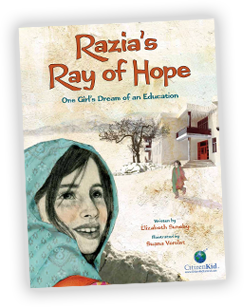
If your kids are complaining about school, don't lecture them about the gift of an education. Instead, read them Razia's Ray of Hope: One Girl's Dream of an Education by Elizabeth Suneby, illustrated by Suana Verelst (Kids Can Press, 9/13).
This inspiring story is about a brave girl in Afghanistan who must convince the men in her family to allow her to attend school. The author, Elizabeth Suneby , was inspired by Razia Jan, one of CNN’s 2012 Top 10 Heroes of the Year . Jan founded the Zabuli Education Center outside Kabul, near villages where there had never been a school for girls.
Instead of telling us information about the school from an insider's perspective, Suneby introduces us to another Razia, a girl who gazes longingly at the school from the outside. Details about life in Afghanistan are seamlessly woven into the story. As they cheer for Razia on her brave quest, American children might begin to understand the value of an education and why so many of their counterparts in other countries desperately desire it.
Come visit me on the Fire Escape!




Published on November 11, 2013 19:56
October 31, 2013
2013 Teens Between Cultures Prose Contest Winner
I'm delighted to announce the winner of the 11th annual Mitali's Fire Escape Teens Between Cultures Prose Contest. In the past, I've award three prizes (first, second, third), but this year I decided to pick only one. Here it is—enjoy.

Bridging the Gap
by Tran D., Age 16
“It was a rough marriage. She left him...” My mom spoke into the phone in Vietnamese, “Poor thing, he lives alone now. He rents the house from an old landlady.”
“Is she talking about Chú Bích?” I asked my sister from the backseat.
Chú Bích is my uncle—”chú” implied that he was my dad’s younger brother. I can’t recollect any memory of him but I distinctly remember getting trouble for stealing a picture of him and his bride because it was the prettiest thing five year old me had seen. He had let me keep it and take it with me to America. It still sits in one of the many dusty albums closed away in my parents’ bedroom.
I stared out the window on the drive home, but still intently listening to the conversation, trying to glean as much information as I could. We were driving home from Wal-Mart where we had loaded up on supplies for our upcoming trip to Vietnam.
“Candy,” my mom said as she rushed to that very aisle, “We have to buy a lot of candies to give to the kids over there.”
I finally understood--even candy was a luxury for them. This made me anxious, this unfathomable disparity between living standards. What if I was seen as too snobby? And worse yet, what if I wasn’t able to conciliate with the conditions there? However, despite these worries, I looked forward to the trip.
It was our family’s first return in nearly ten years and mine since I was five years old. The first five years of my life, I can barely recollect even as I searched into my deepest archives.
The memories I still held on to were like vivid snapshots—memories of eating mãng cầu on the doorsteps of our pastel colored home, facing our neighbors’ houses across the narrow street; of holding onto my sister’s hand as we walked around the corner to a ma and pop store to buy our favorite snacks; of the old peddler lady who sold my favorite dessert, Chè đậu đen, the kind with the soft and chewy black beans. They were fleeing memories, moments captured within the seconds that somehow managed to escape the doom of time. They were all I had, yet they weren’t enough.
During this trip, I was able to replenish my remembrance. Many of these recollections consisted of beautiful sceneries, from the dusty, unpaved roads of the countryside to boundless night skies; moreover, there were the nostalgic memories of the names and faces of whom I had never met, yet inexplicably had played a part in my family’s past. But perhaps the most profound experience was the two week stay in Saigon at Chú Bích’s two-room home, varnished with blue and green floor tiles. It was on these tiles that I had helped lay out breakfast each morning; on these tiles I had taught my cousins to play Double Speed, a card game that we played zealously at every free moment we had. In a place that was so different from what I was accustomed to, I had found comfort and a familial love that resonated through its walls. I couldn’t fully understand all the struggles or pain he had gone through, but Chú Bích had welcomed us into his home and gave us all he had. He represented a fragment of Vietnam that, in my naivete, I failed to grasp: through all the turmoil and difficulties, he still had the strength to love and the perseverance to toil on. Within these weeks, my sense of materialism tumbled away, and all that was left were the people that I love and the place that I had come from.
That summer, I fell in love with Vietnam. Struggling to find its own economic standing, It is a country ravaged by internal conflict, but it was my own. That summer, I found a missing piece of my childhood, and a neglected piece of myself.
In all my struggles and perseverance to do well in my studies and strive to attend the best colleges in America, I had forgotten much of my roots, as Vietnamese classes gave way to school projects during the weekend and cultural festivals gave way to study dates at Starbucks. My parents, in their struggle to survive in a foreign country and raise their two daughters, could not afford the time to reinforce what they had so cherished. They gave up everything they had—money, family, childhood friends— for the sake of my future. However at some point, I realized that I was old enough to understand the importance of tradition and heritage. It was now my own responsibility to not only preserve my roots, but bridge the gap between the country I was born in and the one I live in.
Tran on growing up between cultures:
For me, the hardest thing about balancing two cultures is simply that, keeping the balance. While I am perpetually adapting to and being immersed into one culture, I also have to be careful not to lose touch with the other culture. Not only do I feel obligated to fit in with my family and my friends, I also have to be able to come to terms with myself as a middle point between two cultures. At times, it is a difficult dichotomy to maintain, but at the end of the day, it is something to be proud of.
The best thing about having two cultures is that it allows me to be more open minded, because I am more familiar and comfortable with the idea of 'different'. Having already experienced these two spheres of culture, American and Vietnamese, both of which are quite different from the other, it is much easier for me to grasp that there are thousands of different spheres of culture in the world, each with its own idiosyncrasies.
And here's this year's poetry contest winner .
Photo courtesy of eutrophication&hypoxia via Creative Commons.
Come visit me on the Fire Escape!





Bridging the Gap
by Tran D., Age 16
“It was a rough marriage. She left him...” My mom spoke into the phone in Vietnamese, “Poor thing, he lives alone now. He rents the house from an old landlady.”
“Is she talking about Chú Bích?” I asked my sister from the backseat.
Chú Bích is my uncle—”chú” implied that he was my dad’s younger brother. I can’t recollect any memory of him but I distinctly remember getting trouble for stealing a picture of him and his bride because it was the prettiest thing five year old me had seen. He had let me keep it and take it with me to America. It still sits in one of the many dusty albums closed away in my parents’ bedroom.
I stared out the window on the drive home, but still intently listening to the conversation, trying to glean as much information as I could. We were driving home from Wal-Mart where we had loaded up on supplies for our upcoming trip to Vietnam.
“Candy,” my mom said as she rushed to that very aisle, “We have to buy a lot of candies to give to the kids over there.”
I finally understood--even candy was a luxury for them. This made me anxious, this unfathomable disparity between living standards. What if I was seen as too snobby? And worse yet, what if I wasn’t able to conciliate with the conditions there? However, despite these worries, I looked forward to the trip.
It was our family’s first return in nearly ten years and mine since I was five years old. The first five years of my life, I can barely recollect even as I searched into my deepest archives.
The memories I still held on to were like vivid snapshots—memories of eating mãng cầu on the doorsteps of our pastel colored home, facing our neighbors’ houses across the narrow street; of holding onto my sister’s hand as we walked around the corner to a ma and pop store to buy our favorite snacks; of the old peddler lady who sold my favorite dessert, Chè đậu đen, the kind with the soft and chewy black beans. They were fleeing memories, moments captured within the seconds that somehow managed to escape the doom of time. They were all I had, yet they weren’t enough.
During this trip, I was able to replenish my remembrance. Many of these recollections consisted of beautiful sceneries, from the dusty, unpaved roads of the countryside to boundless night skies; moreover, there were the nostalgic memories of the names and faces of whom I had never met, yet inexplicably had played a part in my family’s past. But perhaps the most profound experience was the two week stay in Saigon at Chú Bích’s two-room home, varnished with blue and green floor tiles. It was on these tiles that I had helped lay out breakfast each morning; on these tiles I had taught my cousins to play Double Speed, a card game that we played zealously at every free moment we had. In a place that was so different from what I was accustomed to, I had found comfort and a familial love that resonated through its walls. I couldn’t fully understand all the struggles or pain he had gone through, but Chú Bích had welcomed us into his home and gave us all he had. He represented a fragment of Vietnam that, in my naivete, I failed to grasp: through all the turmoil and difficulties, he still had the strength to love and the perseverance to toil on. Within these weeks, my sense of materialism tumbled away, and all that was left were the people that I love and the place that I had come from.
That summer, I fell in love with Vietnam. Struggling to find its own economic standing, It is a country ravaged by internal conflict, but it was my own. That summer, I found a missing piece of my childhood, and a neglected piece of myself.
In all my struggles and perseverance to do well in my studies and strive to attend the best colleges in America, I had forgotten much of my roots, as Vietnamese classes gave way to school projects during the weekend and cultural festivals gave way to study dates at Starbucks. My parents, in their struggle to survive in a foreign country and raise their two daughters, could not afford the time to reinforce what they had so cherished. They gave up everything they had—money, family, childhood friends— for the sake of my future. However at some point, I realized that I was old enough to understand the importance of tradition and heritage. It was now my own responsibility to not only preserve my roots, but bridge the gap between the country I was born in and the one I live in.
Tran on growing up between cultures:
For me, the hardest thing about balancing two cultures is simply that, keeping the balance. While I am perpetually adapting to and being immersed into one culture, I also have to be careful not to lose touch with the other culture. Not only do I feel obligated to fit in with my family and my friends, I also have to be able to come to terms with myself as a middle point between two cultures. At times, it is a difficult dichotomy to maintain, but at the end of the day, it is something to be proud of.
The best thing about having two cultures is that it allows me to be more open minded, because I am more familiar and comfortable with the idea of 'different'. Having already experienced these two spheres of culture, American and Vietnamese, both of which are quite different from the other, it is much easier for me to grasp that there are thousands of different spheres of culture in the world, each with its own idiosyncrasies.
And here's this year's poetry contest winner .
Photo courtesy of eutrophication&hypoxia via Creative Commons.
Come visit me on the Fire Escape!




Published on October 31, 2013 16:51
October 18, 2013
Introducing OPEN MIC Contributor Greg Neri
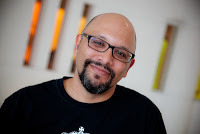 I'm proud to showcase the nine authors who collaborated with me on
OPEN MIC: RIFFS ON LIFE BETWEEN CULTURES IN TEN VOICES
(an anthology published 9.10.13 by Candlewick Press). Publishers Weekly had this to say about our book:
I'm proud to showcase the nine authors who collaborated with me on
OPEN MIC: RIFFS ON LIFE BETWEEN CULTURES IN TEN VOICES
(an anthology published 9.10.13 by Candlewick Press). Publishers Weekly had this to say about our book:
... As Perkins notes, “Humor has the power to break down barriers and draw us together across borders,” and the stories within bear that out ... In “Under Berlin,” written in verse, G. Neri describes a “game” that a biracial American family plays on the German subway: seeing how quickly two elderly white women will change seats after the black father sits between them ...
Today I'm delighted to introduce you to my friend Greg Neri , author of "Under Berlin," a story in verse that's eighth in the OPEN MIC lineup. Here are a few paragraphs from the middle of the piece that showcase Greg's mastery of voice:
"Why can't we take a taxi?" I ask.
"You all gonna pay for it, Reina? asks Daddy,
his southern twang
more out of place
than we are.
We move slowly across the platform,
pushing into the overcrowded train car.
"Sure, I'll pay,
just as soon as I start my own
currywurst stand."
I can still smell it from here.
My brother, Oscar laughs. "Yeah, right."
I stare at his pudgy face,
trying not to get squished
by the rush-hour stampede.
"What's so funny?" I say.
Oscar laughs again.
"A black American girl
servin' up German sausage?
Sure, that's not funny
at all."
"I'm not black," I say.
Greg's award-winning books range from graphic novels to novellas in free verse, including Chess Rumble, Ghetto Boy, Surf Mules, and Yummy.
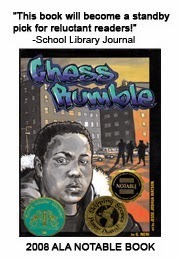
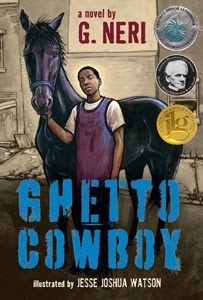

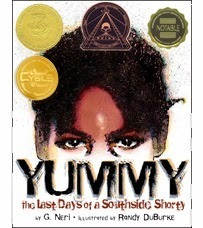
"Some people are curious about my ethnic background," says Greg. "Well, I'm Mexican, Filipino and Creole (French, African, Spanish, Native American) or as we say Crefilican-American or more accurately Nafranishafripinocan (go figure). Actually, I feel I am a great example of globalization. The Mexican side covers the Hispanic countries, Filipino represents Asia, Creole covers Europe, Africa and North America."
Find out more about Greg and his work by following him on twitter or facebook, or by visiting his site.
Come visit me on the Fire Escape!




Published on October 18, 2013 13:03
October 9, 2013
2013 Teens Between Cultures Poetry Contest Winner
I'm delighted to announce the winner of the 11th annual Mitali's Fire Escape Teens Between Cultures Poetry Contest. In the past , I've award three prizes (first, second, third), but last year I decided to pick only one and I'm doing the same this year. This made judging the contest harder than ever. After a long decision-making process, please enjoy the 2013 Fire Escape Teens Between Cultures Poetry Contest winner.
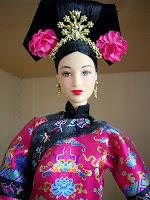
Third Eye
by Alice L.
I grew up in the Midwest
Where oceans of gold-streaked cornfields
Swayed under the sun
And skies stretched like weary skin,
Wrinkled with seasons.
The Midwest grew recessive eyes
Almost as easily as it grew corn.
Among the fair-haired, blue-eyed children,
I was always a stranger, an alien –
A creature of far-away origins.
I could never be one of them.
We were separated by something
I could not quite understand then.
It was not so much that strangers questioned
My dark hair and epicanthic folds
And the slight lilt of my tongue.
It was more because
My parents carried a thousand years of forgotten names:
Ancestors from ancient Asia’s silk scrolls and dust cities
Came to haunt me in our common memory,
Lingering traces in the wirings of our thoughts,
Burdens, maybe, both curses and gifts.
Inevitably, burdens became my legacy:
Beautiful histories no one could remember,
A language of four thousand dusty characters
Whose limbs changed every five centuries or so,
Wars and kingdoms and Confucius –
One summer I grew an invisible third eye
And I sat in the dark,
Sipping otherworldly memories like jasmine tea.
I carried English words like they were my own –
But in the dark,
Strange emotions danced footprints across my heart.
I tangled two languages together trying to explain them.
But I could not.
On growing up between cultures
The hardest thing about balancing two cultures is figuring out how to incorporate both cultures into part of my identity. I'm very proud of my Chinese-American identity, but I constantly ask myself what I can do to better become both halves of my identity. I want to be as authentically American as possible, and I also want to be as authentically Chinese as possible. I want to feel like I really am a part of both cultures. How does one be completely two cultures? The best thing about balancing two cultures is the ability to flow between the two and understand the culture of both. I'm an example of the "tossed salad" (not "melting pot") American kid.
"Chinese Barbie" courtesy of FreddyCat1, via Creative Commons. Stay tuned for the prose contest winner!Come visit me on the Fire Escape!




Published on October 09, 2013 12:35
September 25, 2013
OPEN MIC: Introducing Contributor Varian Johnson ...
I'm continuing to showcase the nine authors who collaborated with me on
OPEN MIC: RIFFS ON LIFE BETWEEN CULTURES IN TEN VOICES
(an anthology published 9.10.13 by Candlewick Press). The Bulletin for the Center of Children's Books recently had this to say about our book:

Today I'm delighted to introduce you to my friend Varian Johnson , author of "Like Me," a short story that's sixth in the OPEN MIC lineup and is especially "honest, refreshing, and frank." Here are the first few paragraphs to lure you:

Varian's award-winning books include Saving Maddie (Delacorte / Random House, 2010), My Life as a Rhombus (Flux / Llewellyn, 2008) and A Red Polka Dot in a World Full of Plaid
(Genesis Press, 2005). He was born and raised in Florence, South
Carolina, and attended the University of Oklahoma, where he received a
BS in Civil Engineering.
Varian later attended the Vermont College of
Fine Arts, where he received an MFA in Writing for Children and Young
Adults. He's also the co-founder of The Brown Bookshelf ,
one of my favorite sites that highlights established and
up-and-coming African-American authors of children’s and young adult
literature. Today he lives and writes in Austin, Texas.
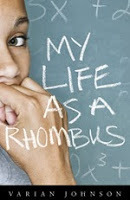
"I was the typical high-school geek," he says. "I played the baritone in the marching band, was a member of the Academic Challenge Team, and counted my Hewlett-Packard 48G as one of my most prized possessions."
Find out more about Varian and his work by following him on twitter or facebook (highly recommended — his engaging and delightful voice is showcased sweetly on social media).
Come visit me on the Fire Escape!




(an anthology published 9.10.13 by Candlewick Press). The Bulletin for the Center of Children's Books recently had this to say about our book:
It’s
often said that good literature for young people can act as a mirror to
one’s own experiences and a window into others’—this anthology fills
the bill, providing an accessible assessment of contemporary race
relations, while also being as honest, refreshing, and frank as the
titular open mic suggests.

Today I'm delighted to introduce you to my friend Varian Johnson , author of "Like Me," a short story that's sixth in the OPEN MIC lineup and is especially "honest, refreshing, and frank." Here are the first few paragraphs to lure you:
"Griff, snap out of it," Evan says, jabbing his elbow into my rib cage. "You're missing the newbies."
I glance at Evan—trying to ignore the scraggly reddish-brown "soul patch" on this chin—then turn to follow his gaze. A mob of girls, huddled together like starry-eyed lambs heading to the slaughter, make their way across the quad with Principal Greer herding them along. With their blinding-white blouses and heavily starched skirts, they look like rejects from an episode of Gossip Girl.
Of course, my blazer and slacks would fit in the show just fine. As Principal Greer says, we're all cut from the same cloth here.

Varian's award-winning books include Saving Maddie (Delacorte / Random House, 2010), My Life as a Rhombus (Flux / Llewellyn, 2008) and A Red Polka Dot in a World Full of Plaid
(Genesis Press, 2005). He was born and raised in Florence, South
Carolina, and attended the University of Oklahoma, where he received a
BS in Civil Engineering.
Varian later attended the Vermont College of
Fine Arts, where he received an MFA in Writing for Children and Young
Adults. He's also the co-founder of The Brown Bookshelf ,
one of my favorite sites that highlights established and
up-and-coming African-American authors of children’s and young adult
literature. Today he lives and writes in Austin, Texas.

"I was the typical high-school geek," he says. "I played the baritone in the marching band, was a member of the Academic Challenge Team, and counted my Hewlett-Packard 48G as one of my most prized possessions."
Find out more about Varian and his work by following him on twitter or facebook (highly recommended — his engaging and delightful voice is showcased sweetly on social media).
Come visit me on the Fire Escape!




Published on September 25, 2013 11:18
September 20, 2013
Conversations about Race, Storytelling, and Authenticity
You're invited to two discussions, one virtual and one in real life. First, please read and comment on my guest post at the Children's Books Council Diversity Blog: "
Is the Race Card Old School?
" Here's an excerpt:
If you'd like this kind of dialogue in real life, as well as some intimate, face-to-face time with editors Cheryl Klein (Scholastic) and Stacy Whitman (Tu Books | Lee and Low), agent Regina Griffin, and authors Sundee Frazier (BRENDAN BUCKLEY'S SIXTH-GRADE EXPERIMENT) and Eliot Shrefer (ENDANGERED), please join us at the Highlights Foundation workshop, " Writing Across Boundaries ," this October 27-30. Scholarships are available!
Workshop Description
For any writer it’s a challenge to write across gender, culture, or race. You worry that you won’t know the subtleties of the language or the mannerisms of the characters. You wonder if it’s even your story to tell. This workshop will help you identify and address the difficulties and joys of writing across boundaries.
Join our award-winning faculty as they give you tips on research, tell you how to put yourself in the characters’ shoes, and discuss the issues to consider in language and milieu. Our special guest editor will give you insight into editorial questions considered with a novel written across boundaries. You’ll leave with a richer understanding of how to write an authentic voice that resounds for readers.
During the class, you’ll workshop the first ten pages, so please submit those pages two weeks prior to the workshop. Additionally, bring a summary and up to fifty pages of your novel to the workshop for reference and to use in workshop exercises.
Workshop Information
Begins with dinner on Sunday, October 27, and ends with lunch on Wednesday, October 30, followed by an optional tour of Highlights for Children and Boyds Mills Press at 1:30 p.m.
Come visit me on the Fire Escape!




... Why does race trump in North America when it comes to a discussion about authenticity and fiction? My best guess is that we adults are stuck in that particular paradigm of identity. Race takes primacy when it comes to how we see others and how we see ourselves. In our minds, it still parallels the deeper question of power at the heart of this conversation, because the appropriation of story is a powerful act. And perhaps we’re (sort of) right ...
If you'd like this kind of dialogue in real life, as well as some intimate, face-to-face time with editors Cheryl Klein (Scholastic) and Stacy Whitman (Tu Books | Lee and Low), agent Regina Griffin, and authors Sundee Frazier (BRENDAN BUCKLEY'S SIXTH-GRADE EXPERIMENT) and Eliot Shrefer (ENDANGERED), please join us at the Highlights Foundation workshop, " Writing Across Boundaries ," this October 27-30. Scholarships are available!
Workshop Description
For any writer it’s a challenge to write across gender, culture, or race. You worry that you won’t know the subtleties of the language or the mannerisms of the characters. You wonder if it’s even your story to tell. This workshop will help you identify and address the difficulties and joys of writing across boundaries.
Join our award-winning faculty as they give you tips on research, tell you how to put yourself in the characters’ shoes, and discuss the issues to consider in language and milieu. Our special guest editor will give you insight into editorial questions considered with a novel written across boundaries. You’ll leave with a richer understanding of how to write an authentic voice that resounds for readers.
During the class, you’ll workshop the first ten pages, so please submit those pages two weeks prior to the workshop. Additionally, bring a summary and up to fifty pages of your novel to the workshop for reference and to use in workshop exercises.
Workshop Information
Begins with dinner on Sunday, October 27, and ends with lunch on Wednesday, October 30, followed by an optional tour of Highlights for Children and Boyds Mills Press at 1:30 p.m.
Come visit me on the Fire Escape!




Published on September 20, 2013 11:01
September 18, 2013
"It's A Girl" are Three Deadly Words
Not many third daughters like me see the light of day in my native land. I'd like to see this film.
Come visit me on the Fire Escape!




Come visit me on the Fire Escape!




Published on September 18, 2013 13:22



